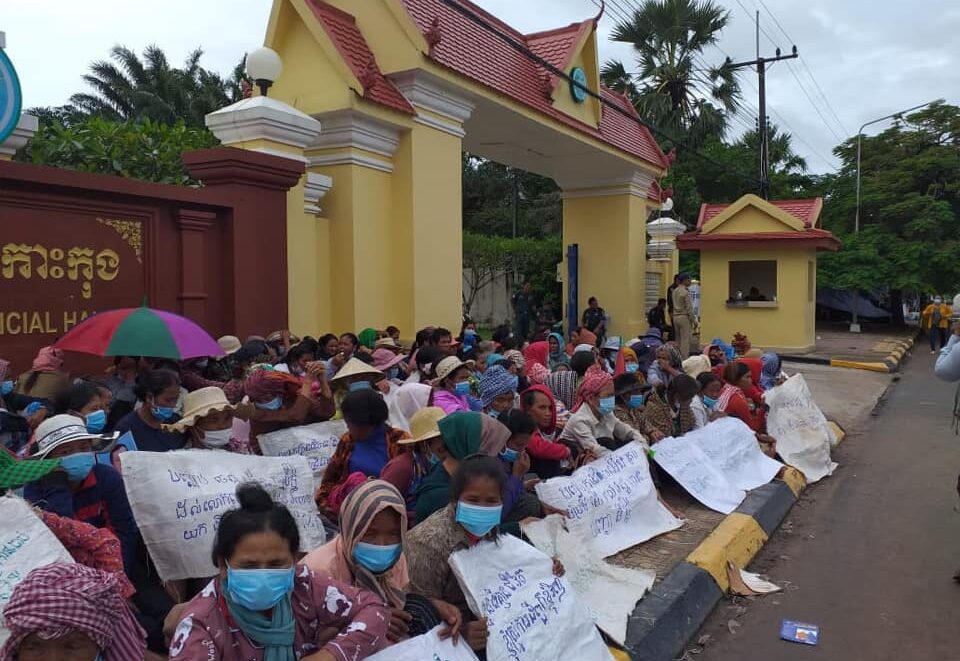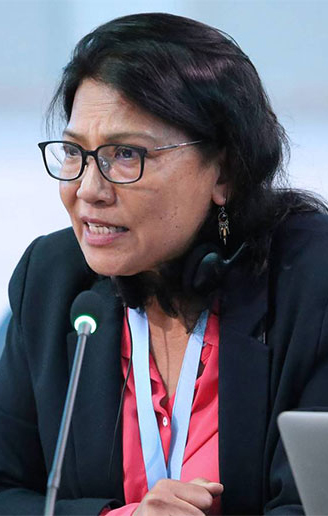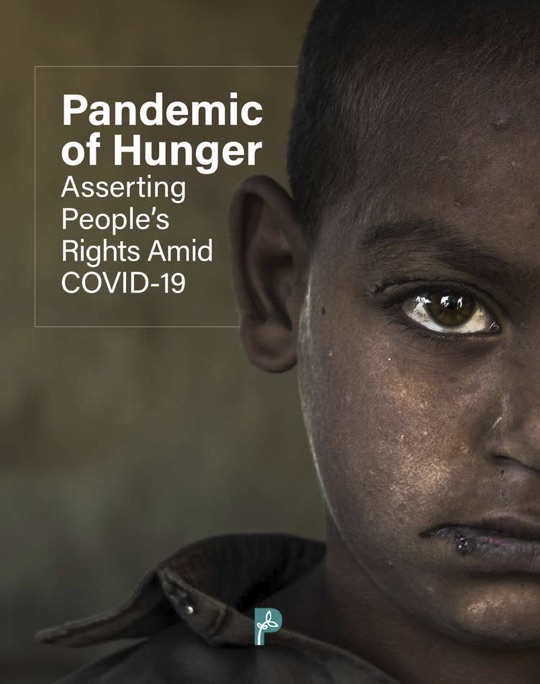
Photo: The pandemic did not stop farmers from Svay Rieng province, Cambodia from holding a protest in front of the Ministry of Interior to demand their rights to land. Genuine land reform is matter of social justice and a necessary step towards achieving environmental sustainability. (Credit: CCFC Cambodia)

By: Sarojeni Rengam, PAN Asia Pacific executive director
Going into 2021, many are pinning their hopes on the end of the COVID-19 pandemic, which has drastically transformed the way many people across the globe live and work. Among those highly affected are millions of small food producers. The pandemic’s impacts on their livelihoods have not just been a result of movement restrictions and shrinking economies, but more fundamentally, by the worst aspects of an exploitative food and agricultural system that have kept them at the threshold of hunger even sans a severe economic and health crisis.
In the book “Pandemic of hunger: Asserting people’s rights amid COVID-19” that PAN Asia Pacific (PANAP) released in collaboration with our network and partners, we aimed to shine a light on how the most marginalised food producers in the world are faring, as many countries went into lockdowns and businesses closed down. The reality was grimmer than we had imagined.
In a series of interviews with our partners working with rural communities in Cambodia, Vietnam, India, Bangladesh, Sri Lanka, Pakistan, the Philippines and Malaysia during varying stages of the pandemic, we found that there were many common issues. Farmers were unable to recover costs of production due to very low farm gate prices. Rural families were losing valuable sources of supplemental income due to job losses in the cities. In Asia since the Green Revolution, most farmers have already been trapped in a vicious debt cycle, as chemical-intensive agriculture made them highly dependent on costly commercial seeds and inputs, for which they have to borrow from loan sharks or depend on income sent by relatives working in the cities or abroad. The pandemic highlighted their vulnerability under this input-dependent farming system. And with scant or non-existing support from their respective governments, small food producers were among the first to go hungry.
Our interviews further reveal that long-standing social inequalities heightened by the onslaught of neoliberal policies—and not just temporary disruptions in the food supply system—underlie the sufferings of rural peoples. For instance, the lack of land ownership have made farmers ineligible for government emergency aid. Agricultural workers—who even before the pandemic have been one of the most unprotected sectors—suffer from severe pay cuts and almost slave-like work conditions because of mobility restrictions. Giant food traders and corporations continue to control the food supply system and dictate prices, with food producers on the losing end. Liberalization laws and policies that promote reliance on food imports have crippled local agriculture and further eroded the livelihoods of farmers, and their ability to weather a crisis such as COVID-19.
In our book, we supported specific policy reforms that national governments, state food and agriculture agencies and multilateral institutions must urgently implement to address the worsening hunger and food insecurity brought about by the pandemic. This includes direct food subsidies and unconditional cash transfers to the most vulnerable sectors; effective price control on staple food; supporting farmer-led domestic food production to ensure adequate domestic food supply; and institutional and material support to agroecology. But to make agroecology truly viable and beneficial, genuine agrarian reform must be implemented. This means dismantling the corporate or landlord monopoly control over land and other resources for agricultural production; the provision of substantial and reliable state support for production and extension services; and ensuring a domestic market for local agricultural produce, which in turn create the favorable condition for agroecology to flourish.
“Without question, the COVID-19 pandemic has exposed the failure of the profit-driven, market-oriented corporate model of agricultural and food production to feed the world.”
Without question, the COVID-19 pandemic has exposed the failure of the profit-driven, market-oriented corporate model of agricultural and food production to feed the world. But it is also reaffirming the legitimacy and urgency of agroecology as a long existing and viable alternative to the prevalent input-intensive, chemical-based agricultural systems. A video series that PANAP launched during the 16 Days of Global Action on Agroecology reveals that food producers practicing agroecology are more resilient to the external shocks brought on by the pandemic. They are more self-sufficient, better able to feed their families and communities particularly because of the lack of reliance on external inputs. Farmers practicing agroecology have developed strong grassroots organisations to support farmers initiatives to organize local markets and build links with consumers.
However, as long as neoliberal policies that stunt genuine rural development in the Global South remain, food producers will remain impoverished and vulnerable to hunger, long after the current pandemic has ended. That’s why it’s important to grow and sustain farmers’ movements that assert people’s rights and demand people’s food sovereignty in the face of intensifying repression and anti-farmer policies, such as the massive protests against the Farmer Bills we’ve seen in India recently.
It is also important to defend human rights as governments around the world use the pandemic to ramp up harassment, arrests and extra-judicial killings, notably in the Philippines where red-tagging has legimitized a witch-hunt among activists, including peasants and peasant advocates who are leading the assertion of people’s rights—including access to free mass testing and food aid—amid the pandemic.
We hope that this book serves to highlight the urgent needs and demands of small food producers, and craft an international response and solidarity that will finally address the structural causes of hunger so that small food producers who feed the world have secure and safe livelihoods and their rights as farmers and producers are ensured. This is a time of radical transformations, of a true “new normal” shaped by the long-time aspirations of a long-suffering people.
Subscribe to the “Voices from the South” newsletter.
Ms Sarojeni V. Rengam is the Executive Director of Pesticide Action Network Asia and the Pacific (PANAP), a regional network working towards the elimination of the hazards of pesticides and the promotion of sustainable agriculture. PAN AP (with more than 100 partners mainly from the people’s organisations and CSOs) is committed to advancing food sovereignty, gender justice and environmental sustainability.


